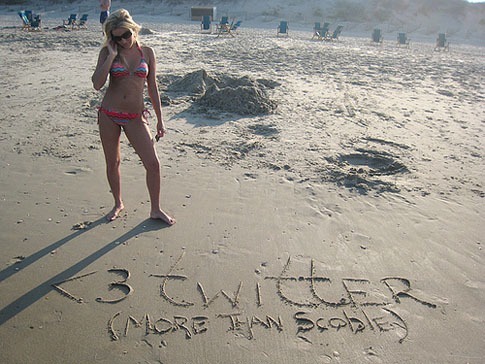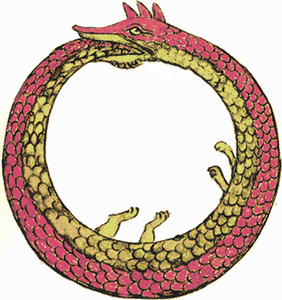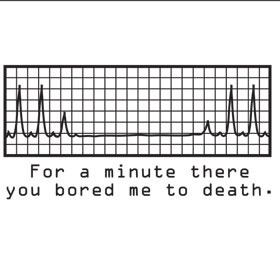Justine Musk's Blog, page 45
February 21, 2010
a writer's starter guide to twitter (or: everything I wish someone had told me when I first started using twitter)

Publishing is changing. "It's not an evolution," Jane Friedman commented recently, "but a revolution…And it's not going back."
Part of that revolution involves the still-evolving notion of author platform. A key part of any author's platform is Twitter. It forms what I consider the Golden Triangle of blog/facebook/twitter that form the heart and home of your online presence.
You find writers all over Twitter. It's not just about self-promotion. Whether you're 'following' the tweets of...
February 19, 2010
find the secrets to your novel in your beginning

Accomplished writer and teacher (and all-around interesting dude) Les Edgerton tells of some advice he gave to a student who didn't know how to end her story. "Go back to the beginning," he said (I'm paraphrasing), because often the beginning of your story holds the clue to the ending.
The opening of your story establishes your contract with the reader. You set the tone, you establish the storyworld, you succeed or fail to initially prove yourself as a writer (as in: you have the...
find the secrets in your beginning

Accomplished writer and teacher (and all-around interesting dude) Les Edgerton tells of some advice he gave to a student who didn't know how to end her story. "Go back to the beginning," he said (I'm paraphrasing), because often the beginning of your story holds the clue to the ending.
The opening of your story establishes your contract with the reader. You set the tone, you establish the storyworld, you succeed or fail to initially prove yourself as a writer (as in: you have the...
the end is in the beginning: use your opening to figure out your story's conclusion

Accomplished writer and teacher (and all-around interesting dude) Les Edgerton tells of some advice he gave to a student who didn't know how to end her story. "Go back to the beginning," he said (I'm paraphrasing), because often the beginning of your story holds the clue to the ending.
The opening of your story establishes your contract with the reader. You set the tone, you establish the storyworld, you succeed or fail to initially prove yourself as a writer (as in: you have the...
February 17, 2010
cool books giveaway #4-6
(Ah, my adventures in vlogging continue. This time I was so busy trying not to look at the screen but into the actual camera that I d...
February 14, 2010
if you make this mistake, you just might bore your readers to death

I saw the movie LEGION today and thought it was a fun popcorn movie with some great action scenes.
There were also a lot of boring parts.
The movie didn't have enough conflict.
And I'm not talking about the Big Conflict between the people trapped in the diner and the hordes of the possessed who want to exterminate them and kill the unborn child (because the child is The One…). Those scenes were creative and suspenseful. They made the movie.
But in-between the big action scenes, the characters...
February 12, 2010
write an opening that hooks your reader (or: how to raise hell and cause trouble)

1
Rules, of course, are made to be broken.
Here are a few rules about how to open your novel:
DON'T open with description.
Description is static. Static means boring. It doesn't matter what you're describing: description is passive and inert and sits on the page.
You need to emotionally engage the reader and get them curious and worried. Description doesn't do that.
DO trust your reader's intelligence.
You don't need to kill the reader with backstory in order to establish your characters, and...
fascinate your reader from the opening lines: how to raise hell and cause trouble
1
Rules, of course, are made to be broken. As your understanding of fiction deepens, you can start working (and experimenting) with the principles behind them.
Here are a few rules about how to open your novel:
DON'T open with description.
Description is static. Static means boring. It doesn't matter what you're describing: description is passive and inert and sits on the page.
You need to emotionally engage the reader and get them curious and worried. Description doesn't do that.
DO trust...
February 9, 2010
to create and connect: defining 'author platform'

1
I've come to hate the term 'author platform'. It sounds concrete and specific – like something you buy at Home Depot ("Excuse me, miss? Where can I find the author platforms?" "Aisle 3, beside the snow shovels"). But the term itself seems to be a bit vague, meaning different things to different people.
Here are some definitions I've rounded up:
Author platform describes all the ways in which you can gain visibility among readers. It refers to your web presence, public speaking and classes...
defining 'author platform'

1
I've come to hate the term 'author platform'. It sounds concrete and specific – like something you buy at Home Depot ("Excuse me, miss? Where can I find the author platforms?" "Aisle 3, beside the snow shovels"). But the term itself seems to be a bit vague, meaning different things to different people.
Here are some definitions I've rounded up:
Author platform describes all the ways in which you can gain visibility among readers. It refers to your web presence, public speaking and classes...



